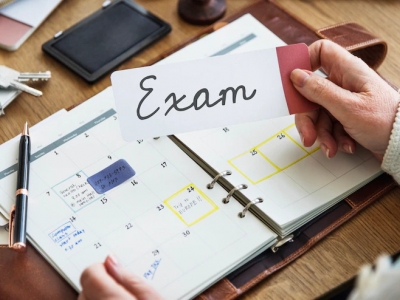One of the most stressful periods in life is exam time. Aren't you always stressed out during exam periods? Have you ever been disappointed with an exam score? Exam pressure can cause a lot of stress and anxiety. But did you know that there are some simple techniques to cope with this situation? This article will teach you how to calm yourself down during this period and prevent disappointment in your exams like never before!
Ways to Calm Yourself:
It's normal to feel anxious during exam season. But there are things you can do to help you relax.
Here are some ideas:
- Get enough sleep: Sleep is important for managing stress. Make sure you're getting enough rest by going to bed and waking up at the same time each day and avoiding caffeine and alcohol in the evening.
- Eat nutritious foods: Eating nourishing foods helps your body cope with stress. So make sure you're eating plenty of fruits, vegetables, whole grains, and lean protein. Avoid sugary and fatty foods, which can make you feel worse.
- Exercise regularly: The feel-good chemicals, endorphins, are released during physical activity. Exercise, even a little bit, might help alleviate tension. So, whenever you can, get out and go for a walk, run, or bike ride.
- Take breaks from studying: Studying non-stop will only make you more stressed out. So take breaks throughout the day to unwind and relax. Take a few minutes to meditate, listen to music, or just take some deep breaths.
You can also visit our subject pages to know or get support for the online math tutoring, online chemistry tutoring and more.
Techniques that can help you calm down include:
- Take a few deep breaths: Inhale through your nose and exhale through your mouth slowly and deeply. This will help you relax and focus.
- Find a quiet place: Go to a room where you can be alone, close your eyes, and focus on your breathing.
- Repeat a calming word or phrase: Choose a word or phrase that has personal meaning to you, such as "relax" or "take it easy." Repeat it to yourself several times.
- Visualize a calm scene: Visualize yourself in a tranquil setting, such as a beach or meadow. Focus on the details of the scene, including the sights, sounds, and smells.
- Progressive muscle relaxation: Tensing and relaxing each set of muscles in your body, from your toes up, is a great way to get in shape. As your mental and physical stress levels decrease, you'll feel better.
Tips for getting through the exam period:
- Get plenty of rest and exercise: A well-rested body and mind are better able to handle stress. Make sure you're getting enough sleep and taking breaks during the day to move your body.
- Create a study schedule: Having a plan can help you stay on track and avoid feeling overwhelmed. Include regular breaks in your schedule, so you don't get burned out.
- Create a study plan: Having a set plan for studying will help you stay on track and avoid last-minute cramming, which can only add to your stress levels. Make sure to allow yourself some breaks in between study sessions, so you don't start to feel burned out.
- Take care of yourself: Eating healthy foods, staying hydrated, and getting fresh air can help you feel your best during a challenging time. Avoid using alcohol or drugs as coping mechanisms.
- Talk to someone: Talking to a trusted friend or family member about your stress can be incredibly helpful. If you don't have anyone to talk to, consider seeing a therapist or counselor.
- Practice relaxation techniques: Taking some time each day to relax through deep breathing, meditation, or yoga can assist in diminishing overall stress levels.
The role of teachers in keeping students stress-free during the exam:
Tutors play an important role in keeping students stress-free during exams. Here are some tips for teachers to help students cope with exam pressure:
- Encourage students to take breaks and time out for themselves.
- Help them identify their strengths and weaknesses.
- Develop a positive attitude towards exams and encourage students to see them as an opportunity to learn and improve.
- Teach them effective stress management techniques such as deep breathing and visualization.
- Encourage students to set realistic goals and expectations.
- Be available to answer their questions and concerns about the exam.
There's no doubt that exams can be stressful. But there are ways to calm yourself during exam pressure so that you can do your best. In this article, we've shared some tips on how to calm yourself during exam pressure. We hope these tips will help you feel more relaxed and confident as you face your exams. Start by taking some deep breaths and reminding yourself that you can do this. Then, focus on staying in the present moment and keeping your mind from wandering. If you need more help and support, seek help from Edugraff tutors because they provide the best online tutoring service and help you calm yourself during exam pressure.

